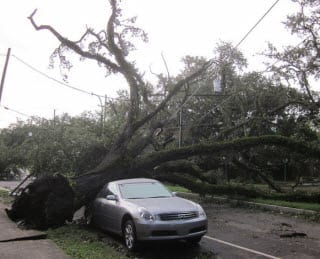Storms leave policyholders wondering about the extent of their coverage.
The 2012 hurricane season is well underway, and now that a severe storm has left damage to many states, many are wondering about details such as the coverage of their auto insurance in these circumstances.
The protection a consumer has for his or her vehicle de pends on the perils covered by the policy.
pends on the perils covered by the policy.
More broadly, though, there are some ways to look at a vehicle’s potential auto insurance coverage, based on the type that has been purchased.
Auto insurance comes in two major forms, and each provides different coverage.
Collision and comprehensive coverages are both required as a part of your auto insurance coverage if you are hoping that your insurer will cover the vehicle in case of a total loss (aside from the deductible).
Collision is the type of coverage that will protect you if your vehicle strikes another object or vehicle. Therefore, if your car hydroplanes as a result of rushing storm waters, causing it to crash, then it would require a claim on your collision coverage.
That said, most damage to vehicles during a hurricane or tropical storm result from water and winds, which would fall under comprehensive coverage (also sometimes known as “other than collision” cover).
Comprehensive auto insurance provides you with protection not only against the theft of your vehicle, but also any broken glass, fire, floodwater or hail damage, and destruction caused by other natural occurrences. Hurricanes and tropical storms fall into that category, typically under the “Acts of God” area of your policy.
Every insurer has its own list of covered perils, so it is important for you to go over your policy to make sure that you have the coverage that you require. If you don’t, then you may want to do some comparison shopping to see what it would cost elsewhere, or simply contact your agent or auto insurance company in order to have the additional coverage added.
It is important to note that if you carry only the bare state minimum of auto insurance, then many of the types of damage that can occur as a result of severe weather will not be covered.
